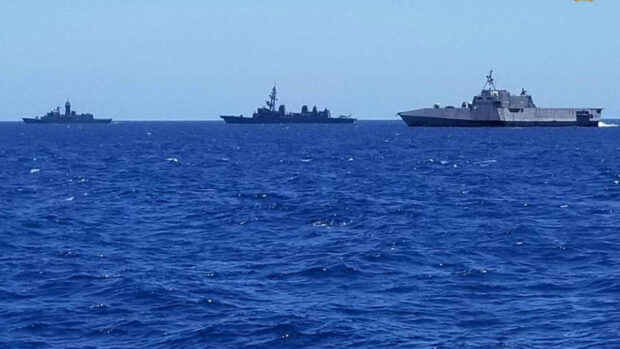
This handout photo taken and received on April 7, 2024 shows participating ships displaying their station-keeping skills with precision as they move into different formations as part of the Division Tactics / Officer of the Watch maneuver during the first Multilateral Maritime Cooperative Activity between the Philippines, US, Australia and Japan in South China Sea. (Picture from Armed Forces of the Philippines / AFP)
MANILA, Philippines – Senator Francis Tolentino thinks the four-nation maritime drills in the West Philippine Sea will not just be a “one-time” event, but an activity that will later on become a “regular occurrence.”
Tolentino, chairperson of the Senate panel on maritime and admiralty zones, said Article 94 of the United Nations Convention on the Law of the Sea (UNCLOS) states that it is the duty of states to cooperate in the maintenance of peace, security and good order in the oceans.
“Yung ginawa kahapon, that’s part of it. Pagsasanib-sanib ng dalawang destroyer — isa buhat sa Australia, isa buhat sa Japan. Dalawang barko ng Pilipinas at ‘yung USS mobile. Ito na ‘yun,” said Tolentino in a press conference on Monday.
(What was done yesterday, that’s part of it. Alliance of two destroyers — one from Australia and one from Japan. Two ships from the Philippines and the USS mobile. This is it.)
“I think this will be a regular occurrence. It is not just a one deal or one stand alone military patrol exercise,” he predicted.
(I think this will be a regular occurrence, It is not just a one deal or one stand alone military patrol exercise.)
Asked what he meant by “regular occurrence,” Tolentino, in a mix of English and Filipino, said: “Regular means it won’t be a one time thing. There will be further patrols with Australia and Japan. Of course, the US is always there.”
But won’t this provoke China?
Tolentino said he personally sees China’s provocation as a “consequence” of the joint maritime patrols, but he likewise emphasized that “positive” outcomes outweigh the negative ones.
“Mas malaki ang positive. One, it will signal a strengthened alliance or alliances with like-minded countries. Two, it will signal a strong deterrence na hindi tayo basta-basta kayang ma-bully,” he emphasized.
(The positive side is bigger. One, it will signal a strengthened alliance or alliances with like-minded countries. Two, it will signal a strong deterrence that we will not be bullied easily.)
He also noted that the Philippines “needs this” amid the Association of Southeast Asian Nation’s (ASEAN) bid to promote a greater ASEAN region as well as [a greater] “Asia Pacific Indo-China Region.”
“And then, ‘yung sinabi ko kahapon na baka later on ma-realize ng China na mas mabuti sa kanilang interes na hayaan ito,” he added.
(And then, similar to what I said yesterday, maybe later on China will realize that it will be better for their interest to allow this.)
The Philippines, Japan, Australia and the United States held maritime activities in the West Philippine Sea on April 7.
READ: 4-nation naval drills set today: For ‘a free, open Indo-Pacific’
The allied countries insisted that the activity was conducted in a manner “consistent with international law as well as domestic laws and rules of respective nations.”